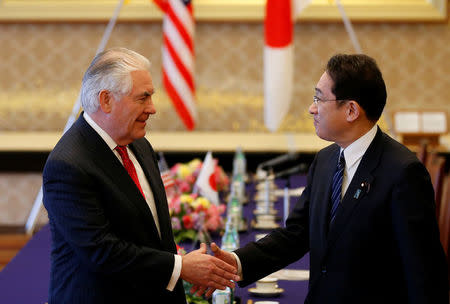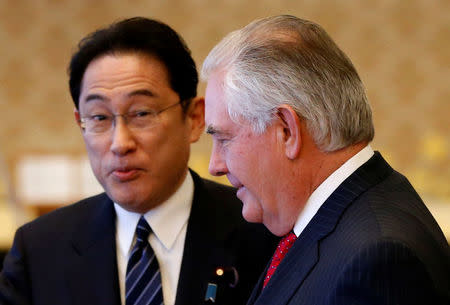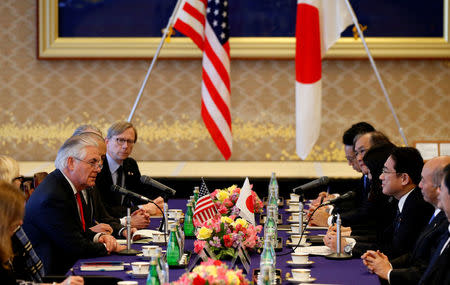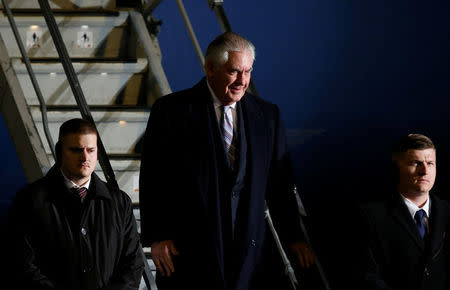Tillerson urges 'new approach' to North Korea, gives no details
By Elaine Lies and Kiyoshi Takenaka TOKYO (Reuters) - The escalating threat from North Korea's nuclear program shows a clear need for a "new approach," U.S. Secretary of State Rex Tillerson said on Thursday, although he did not say what the Trump administration planned. It was the first time that Tillerson, who was speaking at a joint news conference in Tokyo after talks with Japanese Foreign Minister Fumio Kishida, had taken questions from the media since taking office in early February. Two decades of diplomatic and other efforts, including U.S. aid for North Korea, had failed to achieve the goal of denuclearizing Pyongyang, said Tillerson, a former oil executive with no prior diplomatic experience, at the start of his first trip to Asia as secretary of state. "So we have 20 years of failed approach," Tillerson said. "That includes a period where the United States has provided $1.35 billion in assistance to North Korea as an encouragement to take a different pathway." "In the face of this ever-escalating threat, it is clear that a different approach is required. Part of the purpose of my visit to the region is to exchange views on a new approach," he said. A Japanese foreign ministry official said U.S. officials had discussed potential new approaches regarding North Korea, but he declined to elaborate. As Tillerson presses the Chinese to do more to rein in North Korea's nuclear and missile programs, he is expected to tell them the United States intends to increase missile defense in the region, despite Beijing's strong opposition, a U.S. official told Reuters in Washington. An advanced U.S. anti-missile system is being installed in South Korea, and the official said the Trump administration wants to discuss similar improvements with Japan. Tillerson visits South Korea and China later in the week. Tillerson is also likely to raise the prospects for imposing "secondary sanctions" on Chinese banks and other firms doing business with North Korea, the official said, speaking on condition of anonymity. It is among the options being considered in a full review of North Korea policy expected to be completed by late March or early April, the official said.State Department spokesman Mark Toner said on Wednesday Tillerson will have "substantive, hard" talks on next steps in dealing with North Korea but that his visit was not likely to produce an immediate specific response. In Beijing, Chinese Foreign Ministry spokeswoman Hua Chunying repeated Foreign Minister Wang Yi's proposal last week that North Korea should stop its nuclear and missile tests and South Korea and the United States should stop joint military drills and seek talks instead. "We welcome all parties, including the United States, to come up with their own proposals," Hua told a daily news briefing. "As long as these proposals are conducive to ameliorating the present tense situation on the Korean peninsula and are beneficial to maintaining regional peace and stability ... China will have an open attitude." Tillerson made it clear he expected China, North Korea's sole major ally, to do more. "We will be having discussions with China as to further actions we believe they might consider taking that would be helpful to bringing North Korea to a different attitude about its future need for nuclear weapons," he said. SEEKING CLUES Tillerson's comments in Japan were eagerly watched by international observers for indications as to what they meant for the Trump administration's foreign policy. Japan is seeking clues to Washington's policies both on North Korea and China's increasing military and economic clout while hoping to steer clear of trade rows. Tillerson also held talks with Japanese Prime Minister Shinzo Abe and had dinner with Kishida. U.S. President Donald Trump made it a hallmark of his campaign to call on allies, including Japan, to pay more for hosting U.S. forces and other elements of American protection. Tillerson issued a far gentler message at the conference, underscoring the "long-standing" U.S.-Japanese alliance. "While the security environment in this region can be challenging, the United States is committed to strengthening our role, and we welcome an increased Japanese commitment to their roles and responsibilities in our alliance," he said. Tillerson is the second member of Trump's cabinet to visit Japan. Defense Secretary Jim Mattis visited last month, and Vice President Mike Pence is due in April, underscoring U.S. concerns surrounding North Korea's missile and nuclear programs. Abe was the first foreign leader who met Trump after his November election win. North Korea last week launched four ballistic missiles, the latest in a series, and is developing nuclear-tipped missiles that can reach the United States, in defiance of U.N. Security Council resolutions and sanctions. Washington has said all options, including military, are on the table in its review of policies toward North Korea. In the final months of the Obama administration, U.S. officials warned it would blacklist Chinese companies and banks that do illicit business with North Korea if Beijing failed to enforce U.N. sanctions against Pyongyang. The United States has begun deploying the Terminal High Altitude Area Defense missile defense system in South Korea, a move China objects to strongly because it sees the system's radar as a threat to its security. Pak Myong Ho, a North Korean embassy official speaking in Beijing on Thursday, said the deployment "will destroy the balance in Northeast Asia and the Pacific region." "The radar is not aimed at just us," Pak said. "It is also aiming for China and Russia." China's assertiveness in the East China Sea, where it has a territorial row with Japan, and the South China Sea, where it has disputes with the Philippines and several other Southeast Asian nations, were also on the agenda. (Additional reporting by Christine Kim in Seoul, Matt Spetalnick and David Brunnstrom in Washington and Ben Blanchard in Beijing; Writing by Yeganeh Torbati; Editing by Nick Macfie and James Dalgleish)






